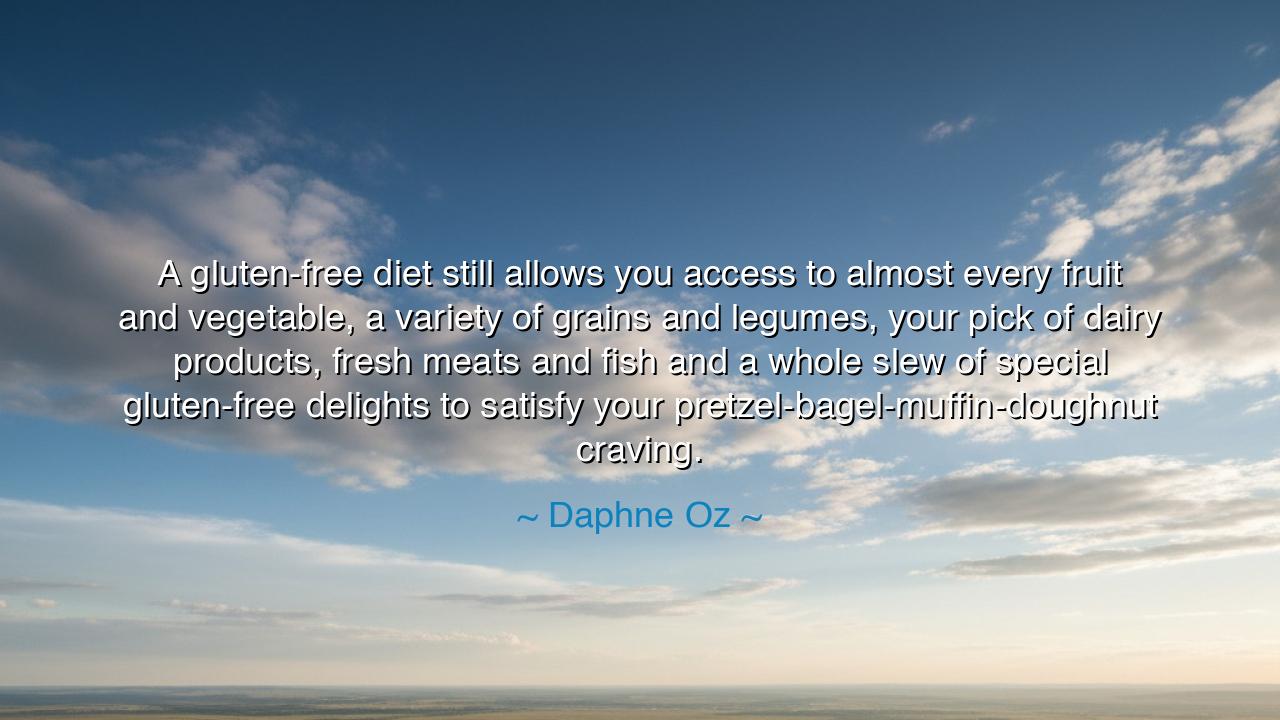
A gluten-free diet still allows you access to almost every fruit
A gluten-free diet still allows you access to almost every fruit and vegetable, a variety of grains and legumes, your pick of dairy products, fresh meats and fish and a whole slew of special gluten-free delights to satisfy your pretzel-bagel-muffin-doughnut craving.






"A gluten-free diet still allows you access to almost every fruit and vegetable, a variety of grains and legumes, your pick of dairy products, fresh meats and fish and a whole slew of special gluten-free delights to satisfy your pretzel-bagel-muffin-doughnut craving." – Daphne Oz
In this declaration, Daphne Oz speaks not merely of food, but of freedom—a freedom that emerges from perspective rather than restriction. Her words rise like a song against the voice of lack, reminding us that life’s richness is not found in what is removed, but in what remains. She proclaims that even within the bounds of a gluten-free diet, there is abundance, color, and joy. The human spirit, she suggests, is not meant to mourn limitation, but to create within it. When the world tells us what we cannot have, it is the mark of wisdom to turn and see what we still possess—and to find delight in it.
The ancients too understood this truth. The Stoic philosophers taught that true freedom lies in one’s attitude toward circumstance. A man in chains, they said, may still be freer than a king if he governs his thoughts. Daphne’s message is an echo of that wisdom. In a time when dietary changes can feel like exile from the familiar pleasures of bread and pastry, she reminds us that such a path need not be bleak. Instead, it is an invitation to rediscover the plenty that nature provides—the radiant fruit, the crisp vegetables, the nourishing grains, the strength of fish and flesh. It is not a punishment, but a return to the essence of nourishment itself.
Consider the story of Pythagoras, the ancient philosopher and mystic who renounced certain foods not out of scarcity, but in pursuit of clarity and balance. His disciples ate simply—fruits, beans, grains—believing that purity of body fostered purity of mind. Yet they did not live in sorrow. They found joy in simplicity, wonder in flavor, and reverence in every meal. So too does Daphne Oz invite modern seekers to embrace a path of mindful abundance, where every bite becomes a choice of gratitude. To follow a gluten-free diet is not to live in deprivation—it is to walk a path of conscious living, where food is both medicine and art.
Her words also speak to the psychology of the table, to the way perception shapes pleasure. When one says, “I cannot eat this,” the spirit sinks into resistance. But when one says, “I choose this,” the same act becomes empowerment. The shift is small but mighty. Daphne’s wisdom lies in transforming diet from discipline into celebration. She does not list the foods excluded, but the multitude still available—the fruits of the earth, the milk of the fields, the fish of the sea, and even the gluten-free delights that satisfy the soul’s craving for comfort. In this way, she restores joy to nourishment, and joy, as the ancients knew, is the highest nourishment of all.
There is also a lesson of adaptation here—a truth that has guided humanity through every age. Civilizations have risen and thrived not by clinging to what was lost, but by embracing what was new. When drought took the crops of Egypt, the people turned to the river’s fish. When the Greeks faced barren soil, they learned the power of olives and legumes. Adaptation is the art of survival, and in modern times, it remains the key to well-being. Daphne Oz teaches this art anew: that the one who adjusts with grace transforms restriction into resourcefulness, and turns every limitation into an opportunity for discovery.
To follow her teaching is to practice gratitude at the table. Look upon your plate not as a list of exclusions, but as a landscape of blessings. Savor the sweetness of a ripe fruit, the tenderness of a roasted vegetable, the strength of fresh fish. Remember that each meal is a meeting between the earth and your body, a covenant of energy and life. If you find yourself longing for what you have lost—be it bread, or something deeper—turn instead toward what still fills your hands and heart. In that turning, you will find abundance waiting.
The lesson, then, is timeless: true abundance is born of perspective, not possession. Whether in diet or in life, do not dwell on the door that has closed—rejoice in the many that remain open. A gluten-free life, like any path of change, invites us to redefine joy, to rediscover wonder in the simple and the pure. Seek the beauty in nourishment, the creativity in constraint, and the gratitude that transforms the ordinary into the sacred.
So let these words endure as both wisdom and blessing: the body thrives not on what it loses, but on what it loves. As Daphne Oz teaches, there is no scarcity in a mindful life, only the endless richness of choice. To eat well is to live well, and to live well is to see that even within limits, the world still overflows with delight.






AAdministratorAdministrator
Welcome, honored guests. Please leave a comment, we will respond soon